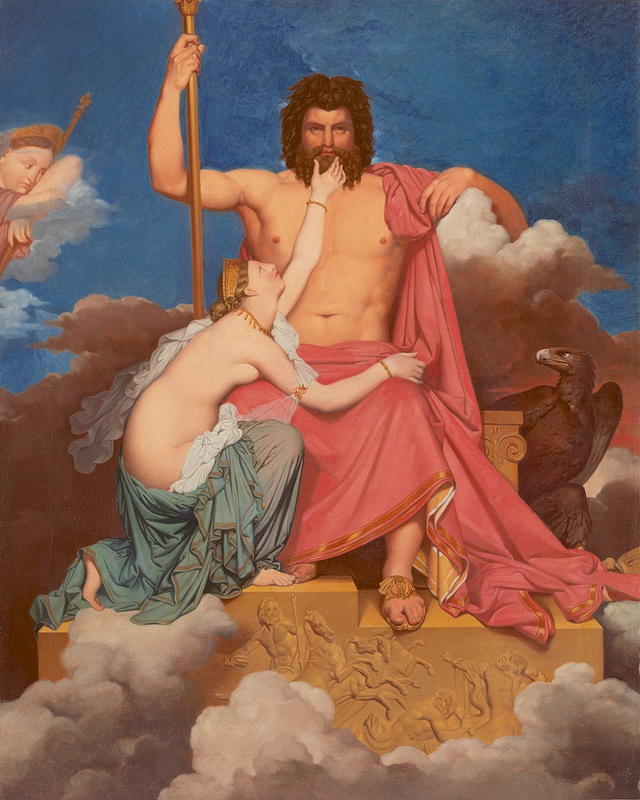More about Jupiter and Thetis

Sr. Contributor
Ingres aimed for upping his reputation as a history painter and capturing the ideal man and woman, but only got a collective “meh” from critics.
For our artist, this painting was intended to be his magnus opus. Ingres had a history of receiving not-so-positive criticism and he was known for not taking it well. This piece was to establish his worth as a history painter and The Iliad was one of his favorite subjects to draw from. This scene of Jupiter and Thetis in particular wasn’t a popular one for artists at the time, though some such as George Romney had rendered the scene in ink. It was an illustration by John Flaxman that particularly inspired Ingres.
Several letters from him at this time show just how enthusiastic he was about this piece, which made the lackluster response from its exhibition all the more disappointing. It didn’t make a splash in being revolutionary or even particularly horrible; the critics just didn’t get it and it flew under the radar for a long time. Ingres couldn’t even find a private buyer for it - the state eventually purchased it.
Ingres chose this scene to paint because he thought the two gods were a perfect choice to depict the ideal man and woman. He was influenced by the style of Raphael, but also was aiming to create a style of his own to set himself apart. He was going against the trend of artists using mythological scenes as an excuse for depicting erotica, but the evident sensuality of the piece is probably part of why the critics misunderstood his intent.
The story behind the image he chose is in the first book of The Iliad when Thetis, the mother of Achilles, asks Jupiter (aka Zeus) for a favor. The Greek army was mean to her son and now he’s off sulking until he gets an apology. It was Achilles’ idea to have his mom ask for said favor with the logic of - hey remember how I’m fated to die soon? Can you ask Zeus to make what little time I have suck less?
Thetis and Zeus have a bit of a history so it wasn’t farfetched to think he might be inclined to help. They first became familiar when Hera led a handful of other gods to rebel against Zeus and restrained him with shackles and Thetis freed him. Since Thetis was a goddess and gorgeous and Zeus was well, Zeus was pretty interested in her right away. Before courting her, he consulted an oracle and was told that Thetis was fated to give birth to a son that would surpass his father. Immediately, he and all other gods vying for her hand lost all interest.
He returns the favor of her kind rescue by pawning her off on a mortal, and unsurprisingly she was not thrilled about this. Safe to say Zeus owed her one since it was his fault that her son was mortal and doomed to die. He agreed to make the Greek army suffer for embarrassing Achilles.
Now, pleading to Zeus wasn’t the first time Thetis tried helping her son. She couldn’t be called an attentive mother, but she was rather overprotective in her own way. Shortly after Achilles was born, she tried making him immortal by covering him in a special mortality-be-gone fire, but her mortal husband, Peleus, walks in on this and puts out the fire. Thetis gets pissed off and abandons them both rather than consider that maybe she should have given Peleus a heads up. Trying to save his newborn currently engulfed by flames is a warranted reaction to say the least.
Achilles didn’t see his mother again until after the mentor who raised him, Chiron, passed away. The Greek army got word of the prophecy that the Trojan War could only be won if Achilles fought with them. Thetis attempts to hide him from his fate, and the Greek army, by disguising him as a woman and having him fostered by King Lycomedes on on the island of Scyros claiming him to be her daughter. This plan worked longer than you’d expect, but Achilles gets lured into the war anyway. By the time of the scene depicted in Jupiter and Thetis, Thetis is beginning to accept her son’s impending death. In her mind, the least Zeus can do is make the army he’s to give his life for appreciate him.
Why was Achilles so pissed off? Well, the Greeks had an oh-so-lovely tradition of capturing women in war and treating them as property, so called “prizes.” The head of the Greek army, Agamemnon, had captured a woman whose father had the wrath of Apollo on his side to help ransom her back, and Achilles helped facilitate the return of the girl. Instead of acting maturely or recognizing that his captive was a human being with a family to return to, Agamemnon just gets annoyed and demands to take Achilles’ “prize,” a woman named Briseis, from him.
Achilles feels singled out and gets bitter over being the only one who had his “prize” taken from him. So, he basically says, "Fine, screw you and your army, I’m leaving." Whether he actually cared about Briseis as a person is debatable (but unlikely). His main motivator was probably his hurt pride and fear of death. Achilles spends the next 70% of The Iliad sulking, waiting on an apology while all the other men in the Greek army keep dying. Both sides of the Trojan War were well aware of the prophecy that the war couldn’t be won without him so an apology was likely inevitable. Achilles asking his mom to go to the king of the gods for revenge was just an added insurance policy.
The other painting from The Iliad done by Ingres is The Ambassadors of Agamemnon in the tent of Achilles, which takes place after Zeus finally gets around to making the Greek army suffer and go beg for Achilles’ help. Achilles gets the apology he wanted so bad and a long list of every possible gift they could offer him, then he responds by telling them all to buzz off.
Sources
- Britannica, The Editors of Encyclopaedia. “Thetis.” Encyclopædia Britannica. Encyclopædia Britannica, inc., n.d. https://www.britannica.com/topic/Thetis.
- Homer, and Rodney Merrill. The Iliad. Ann Arbor: University of Michigan Press, 2007.
- Muntasser, Nayla Kabazi, “Jean Auguste Dominique Ingres’ Jupiter and Thetis.” Master’s thesis, Rice University, 1985.
- Rifkin, Adrian. Ingres, Then and Now. London: Routledge, 2000.
- Statius, P. Papinius. Achilleid, n.d.
- “Thetis.” Encyclopædia Britannica. Encyclopædia Britannica, inc., n.d. https://www.britannica .com/topic/Thetis.
- “Thetis Entreating Jupiter to Honour Achilles: Works of Art: RA Collection: Royal Academy of Arts.” Thetis Entreating Jupiter to Honour Achilles | Works of Art | RA Collection | Royal Academy of Arts, n.d. https://www.royalacademy.org.uk/art-artists/w
- Yasumura, Noriko. Challenges to the Power of Zeus in Early Greek Poetry. London, UK: Bloomsbury Academic, an imprint of Bloomsbury Publishing Plc, 2013.











